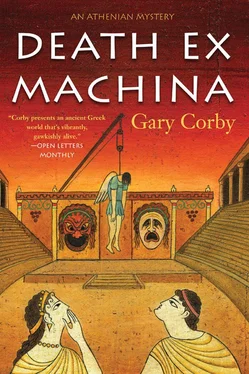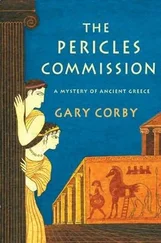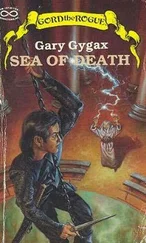Gary Corby - Death Ex Machina
Здесь есть возможность читать онлайн «Gary Corby - Death Ex Machina» весь текст электронной книги совершенно бесплатно (целиком полную версию без сокращений). В некоторых случаях можно слушать аудио, скачать через торрент в формате fb2 и присутствует краткое содержание. Год выпуска: 2015, ISBN: 2015, Издательство: Soho Press, Жанр: Исторический детектив, на английском языке. Описание произведения, (предисловие) а так же отзывы посетителей доступны на портале библиотеки ЛибКат.
- Название:Death Ex Machina
- Автор:
- Издательство:Soho Press
- Жанр:
- Год:2015
- ISBN:978-1-61695-520-5
- Рейтинг книги:3 / 5. Голосов: 1
-
Избранное:Добавить в избранное
- Отзывы:
-
Ваша оценка:
- 60
- 1
- 2
- 3
- 4
- 5
Death Ex Machina: краткое содержание, описание и аннотация
Предлагаем к чтению аннотацию, описание, краткое содержание или предисловие (зависит от того, что написал сам автор книги «Death Ex Machina»). Если вы не нашли необходимую информацию о книге — напишите в комментариях, мы постараемся отыскать её.
Death Ex Machina — читать онлайн бесплатно полную книгу (весь текст) целиком
Ниже представлен текст книги, разбитый по страницам. Система сохранения места последней прочитанной страницы, позволяет с удобством читать онлайн бесплатно книгу «Death Ex Machina», без необходимости каждый раз заново искать на чём Вы остановились. Поставьте закладку, и сможете в любой момент перейти на страницу, на которой закончили чтение.
Интервал:
Закладка:
He struggled for the words.
“To change things?” I suggested. “To change your life?”
“Yes, precisely! We wanted more. You understand.”
I did. Athens was the place where things changed. Diotima and I had been to Ionia, which was ruled by the Persians. The Persians loved stability and order above all things; not the sort of place for a man who wants to improve his lot. Likewise the Spartans loathed change more than anything, and the other Hellene cities clung to tradition.
We walked downstairs as we talked. Diotima was interested in everything about the Phrygians. She asked several questions about their customs, as might a guest. She seemed to have forgotten that she was the mistress of this house. I was pleased to see that Diotima was more relaxed in her house than she had ever been since her birth father died.
We returned to the courtyard, to inspect the back of the house. Standing in one corner was a stone plinth, and upon the plinth was a statue of a hand. It was like a normal bust, but where a bust shows a head, usually of a god, this was a statue of a hand. I’d never seen anything like it. Maia stood beside it.
“What is it?” I asked, before Diotima could get in the same question.
“It is the Hand of Sabazios,” Maia said lovingly. I could hear the reverence in her tone.
“What happened to the rest of him?” I asked.
“Sabazios is our god,” Maia said.
“I thought you worshipped our gods,” I said.
“No,” Maia said shortly.
“I’ve seen a thousand busts of someone’s head, never of someone’s hand,” Diotima added.
The Hand had been covered with white dust from all the nearby carpentry. Maia wiped the Hand clean with a piece of linen. The Hand of Sabazios was right-handed. The thumb, index and middle fingers pointed straight up at the sky. The other fingers were folded in to his palm.
“It is the sign of his benediction,” Maia said. “Sabazios blesses us, and so we are fruitful in the harvest and in all other things.”
“Sabazios is Dionysos then,” Diotima said. “He is also the god of the harvest.”
“We would say Dionysos is Sabazios,” Maia pointed out. “But it all comes to the same thing.”
“Yes, of course,” said Diotima politely. “I myself am a priestess of Artemis. Artemis of the Hunt is our goddess in Athens; yet Artemis as she is worshipped at Brauron is a goddess of young womanhood; and the Artemis at Ephesus where I once served is a goddess of fertility. Different aspects, but they’re all the one goddess. Of course your Sabazios and our Dionysos can be the one god.”
“You served at the Artemision at Ephesus?” Maia said, amazed. Ephesus wasn’t all that far from Phrygia.
“Briefly, but yes,” Diotima said.
Maia and Petros glanced at each other. There was communication in that look, the communication between a couple that no one else can read. But I knew they had reached some conclusion because Petros said, “You have been very good to us, Nicolaos and Diotima.”
“You’re welcome.”
“We would like to invite you to one of our services,” Petros said.
I didn’t have to ask what Diotima thought of that idea. She was always ready to learn something new.
“Thank you, we’d love to come,” I said.
As we spoke there was an odd smell wafting in from the backyard.
“Are you making bread out back?” I asked. Because the smell reminded me of bread, but was somehow different.
“Not bread,” said Petros. “Come see.”
Like most large houses, beyond the courtyard was an open space surrounded by back wall. On one side was the kitchen, on the other was the midden, and in between was a space to park your cart, with a back gate that opened onto a narrow lane.
In that middle space, where I expected the cart, was an enormous wooden vat filled with liquid. Standing over it was a man with dark ringleted hair and a black, bushy beard. He stirred the contents with a stick so large that he had to hold it in both hands. The smell out here was strong. I hoped the neighbors didn’t complain.
“It’s a drink we make,” Maia said. “It’s called beer. Try some.”
Petros handed me a piece of straw. It was dry and quite stiff, as old straw is.
I looked at it blankly. What was I supposed to do with a straw?
“Dip the other end of the straw in the vat,” Petros said. “Put your lips on the top end and suck through it.”
“Suck through a piece of old straw?” I said.
“Like this.” He took a straw of his own and demonstrated. With one end in the liquid and his lips on the other. He sucked and his cheeks made a funny shape. Petros seemed to enjoy this.
I had worried that these Phrygians could be violent. It had never occurred to me that they might be insane.
I put the straw in the vat and stuck my mouth on the other end. I was sure that nothing much could come through that tiny hole, so I sucked hard.
Liquid spurted into my mouth, lots of it. I tried to swallow by reflex. I couldn’t, there was too much in my mouth. I clamped my mouth tight shut to spare myself the indignity of the beer coming back out my mouth.
The beer squirted out of my nostrils.
“Perhaps a bit more gently?” Petros suggested, as I coughed and snorted.
I sucked again, this time determined to get it right.
A trickle of the drink flowed into my mouth. I sucked cautiously harder. The beer shot into my mouth and I had to swallow. The taste was like nothing I’d ever experienced. It wasn’t wine, but it wasn’t water. One thing was immediately obvious: this beer was alcoholic. It was stronger than the watered wine that Hellenes drink. I knew that Egyptians drank beer, but I’d never put any thought to what it might be like.
I asked, “What sort of grapes do you use to make this?”
“Not grapes,” said the man stirring the vat.
To my blank look Maia added, “Beer is made from barley.”
I couldn’t imagine how anyone crushed barley to get enough juice to make anything. But obviously someone had managed, because here was the beer to prove it.
Maia handed a straw to Diotima. She managed to drink from it more elegantly than I had.
I dipped the straw back in and drank more of the strange liquid, then offered my considered opinion: “It’s awful. Don’t you have any wine?”
Maia laughed. “Beer is the sacred drink of Sabazios, just as wine is sacred to Dionysos. In the land we come from, the men prefer beer.”
“Weird.”
The man with the stick smiled but said nothing. He was young and quite good looking. I wondered what had made him move to Athens.
As we left the house, Diotima and I were approached by a man. He’d been waiting in the street.
“Nicolaos! Nicolaos, I must speak to you.” His expression was grave.
“Yes, Theophrastus, what is it?” I asked. For Theophrastus was a neighbor; he owned the house beside Diotima’s. I thought he was about to complain about the mice in the roof.
“It’s these new tenants of yours.”
“What’s wrong, Theophrastus? Are they making too much noise?”
“No, they are very quiet, except when they make repairs, and they have apologized for that. They are much quieter than your previous tenants.”
I was not surprised. The diplomats and wealthy merchants who had previously rented our house had held loud and frequent parties.
“Do they cause trouble in the street?” I asked. “Do they steal things?”
“By no means. They keep to themselves.”
“Then I don’t understand the problem, Theophrastus.”
“They’re metics ,” he said. He glanced left and right, to make sure no one was listening.
“Yes, I know,” I said. “But you just agreed they’re not causing trouble.”
Читать дальшеИнтервал:
Закладка:
Похожие книги на «Death Ex Machina»
Представляем Вашему вниманию похожие книги на «Death Ex Machina» списком для выбора. Мы отобрали схожую по названию и смыслу литературу в надежде предоставить читателям больше вариантов отыскать новые, интересные, ещё непрочитанные произведения.
Обсуждение, отзывы о книге «Death Ex Machina» и просто собственные мнения читателей. Оставьте ваши комментарии, напишите, что Вы думаете о произведении, его смысле или главных героях. Укажите что конкретно понравилось, а что нет, и почему Вы так считаете.












